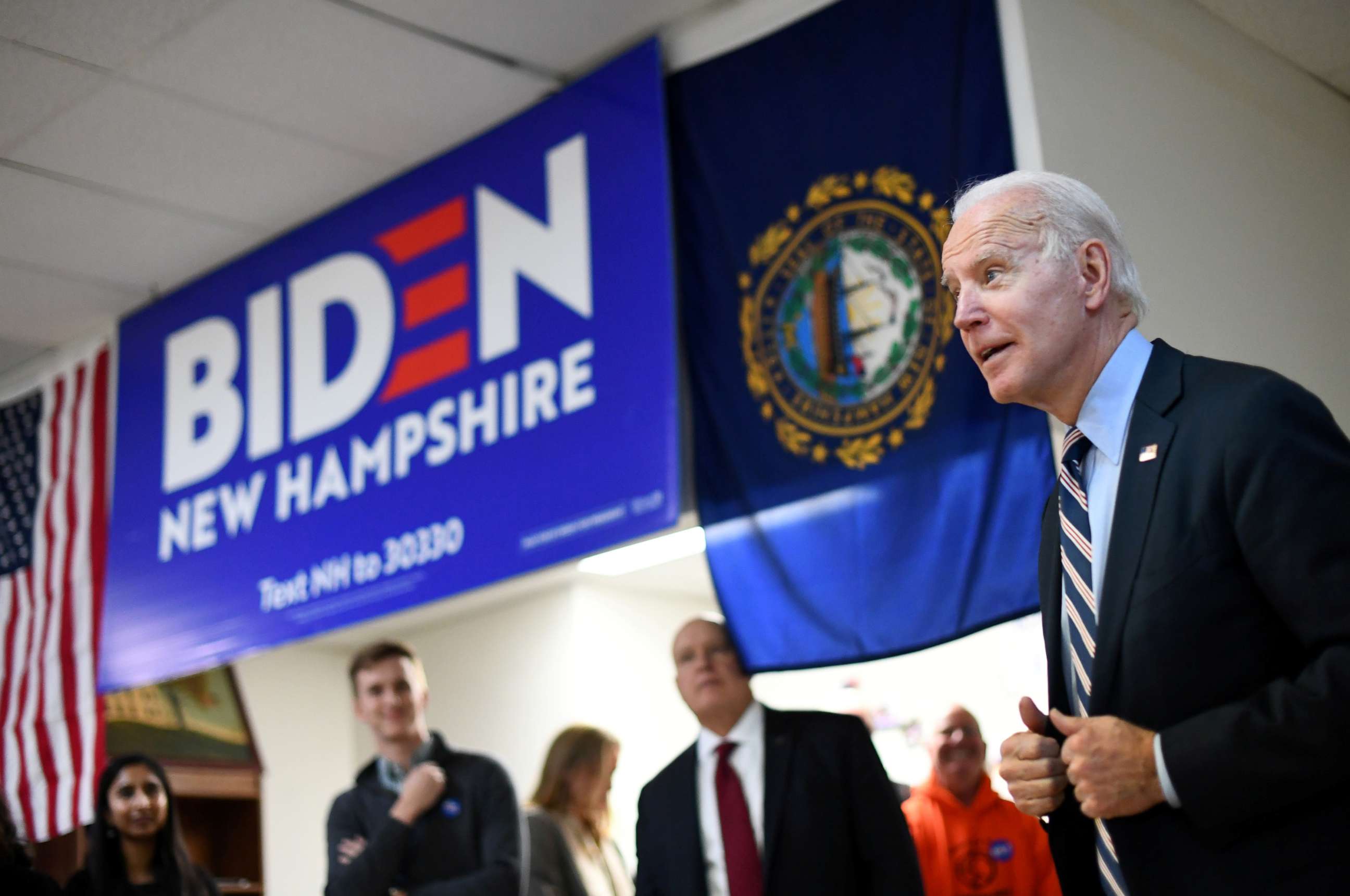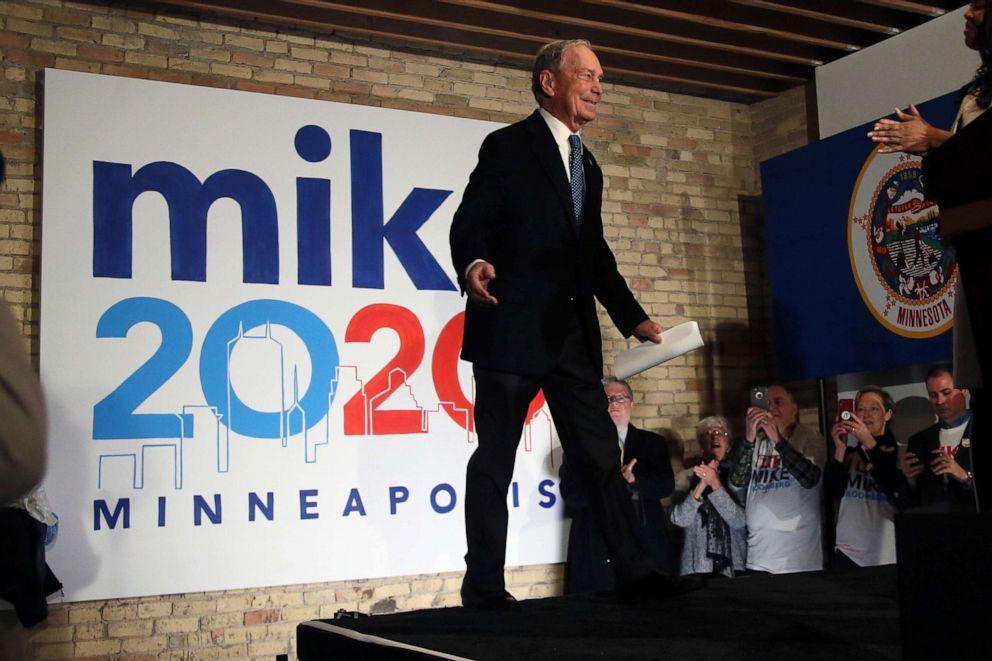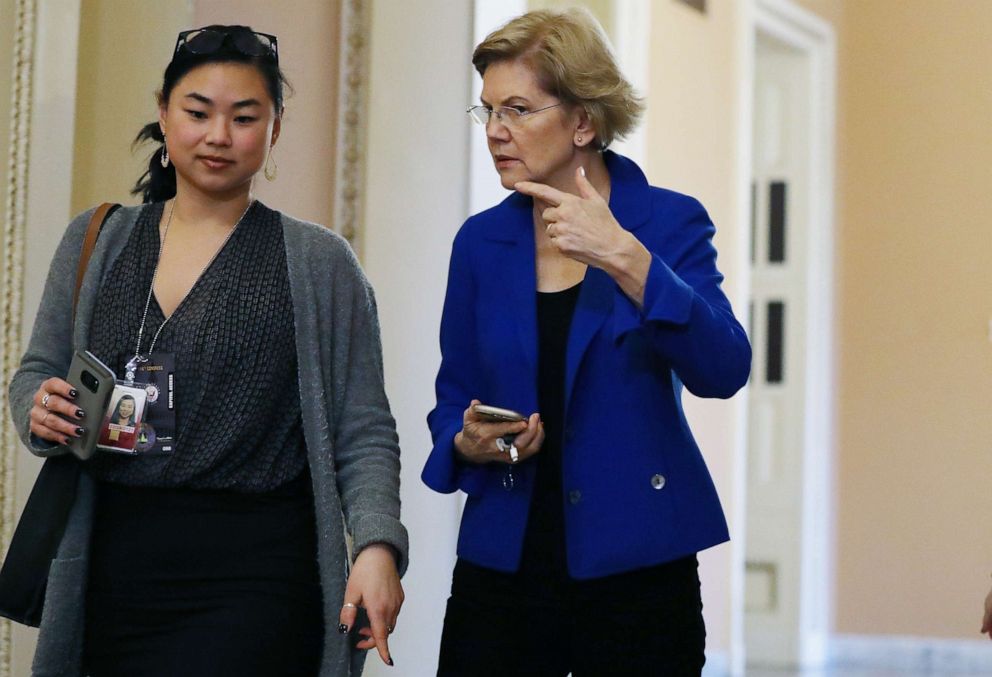Biden holds steady, Warren slips in national poll as Iowa caucuses approach
Joe Biden holds his ground in the new national ABC News/Washington Post poll.
Joe Biden is holding his ground in the race for the 2020 Democratic presidential nomination, according to the latest ABC News/Washington Post poll, with Bernie Sanders a close second and Elizabeth Warren experiencing a drop in support.
Next on the leaderboard are two new arrivals: Mike Bloomberg and Andrew Yang.
With the Feb. 3 Iowa caucuses drawing near, 77% of Democrats and Democratic-leaning independents nationally say they’re satisfied with their choice of candidates. Far fewer, 24%, are very satisfied, although that’s near the average in ABC/Post polls since 2000.
See PDF for full results, charts and tables.
This poll, produced for ABC by Langer Research Associates, finds plenty of room for movement: Just about half of leaned Democrats are very enthusiastic about their choice, and 53% say they’d consider supporting a different candidate. Warren, while weaker as a first choice, leads in second-choice preference.

Furthermore, while Biden continues to prevail by a wide margin as the candidate believed to have the best chance to defeat Donald Trump in the general election, his score on the measure has slipped slightly, from 45% in July to 38% now. Eighteen percent pick Sanders as best against Trump; 10%, Warren.
Biden does best in vote preference among likely voters, defined here as those who say they’re registered and certain to vote in their state’s primary or caucuses. He has 34% support in this group, leading Sanders, at 22%, and Warren, at 14%. Next are Bloomberg, at 7%; Yang, at 6%; Pete Buttigieg, at 4%; and Amy Klobuchar, at 4%.
Results are similar among all those who report being registered. Among all leaned Democrats regardless of registration, though, the gap between Biden and Sanders becomes non-significant, 28% vs. 24%. That’s because Biden’s support skews older and older people are more apt to be registered.
Warren’s support among all leaned Democrats, 11%, is down from 21% in late October. (She’s down similarly, by 11 points, among those who are registered.) Yang is up by 5 points among all leaned Democrats, and so is Sanders -- but in his case the change isn’t statistically significant. It’s Bloomberg’s first appearance in ABC/Post polling this cycle.

Warren’s support is down by 13 to 16 points among women, college graduates, liberals, suburbanites and those under age 50. Biden, on his part, relies heavily on overwhelming support among blacks, while also prevailing among moderates and older voters. Sanders, as noted, does best with younger adults.
Enthusiasm isn’t a differentiator; about half of Biden backers, and supporters of other candidates alike, are very enthusiastic about their choice. (Apart from Biden, sample sizes are too small for individual analysis.) About half of Biden’s supporters, 47%, say they’d consider another candidate, as do 56% of those supporting others. (Results here and below are among all leaned Democrats.)
Notably, Biden has weakened on this measure; his “definite” support is down from 64% in early September to 49% now.
Attributes
While he’s seen as best able to defeat Trump, Biden loses ground on another important attribute: the candidate who’s “closest to you on the issues.” On this, 24% pick Sanders, 22% pick Biden and 15% pick Warren, with all others in the single digits.
In strategic assessments, Biden leads as best able to motivate the Democratic base, selected by 32%, versus 21% for Sanders and 11% for Warren. He also leads as best able to attract independent and moderate voters, with 29% versus 17% for Sanders and 8% for Warren. That assessment may be influenced by Biden’s strength among moderates in particular.
On another question, leaned Democrats are more apt to see a man than a woman as more likely to defeat Trump in November, 28-7%, with 63% saying it doesn’t matter. The gap is wider among Biden supporters, perhaps related to their choice of candidate; 44% see a man as likelier to win versus 4% seeing a woman.
Groups
As noted, Biden wins especially broad support among blacks, 51%, versus 15% for Sanders, with all others in single digits. It’s an important Democratic group; blacks accounted for 25% of Democratic primary voters in 2016, based on results in the 27 states where exit polls were conducted. In early states, blacks ranged from as few as 2 or 3% in Iowa and New Hampshire to a peak of 61% in South Carolina.
Among other groups, Biden has support from 35% of moderates versus 20% of liberals, and from 38% of leaned Democrats age 50 and older, compared with 18% of those under age 40. These numbers flip for Sanders, who wins 30% of liberals but 19% of moderates. Among those under 40 he's at 39%, dropping to 12% among those over 50.

Divisions by age are especially significant given past turnout. In 2016 exit polls, 60% of Democratic voters were 45 or older. Biden’s advantage in being seen as best suited to defeat Trump may also carry weight; in 2016, in the 11 primaries where the question was asked, Democratic voters by about a 2-1 margin picked Hillary Clinton as likelier than Sanders to win in November.
Another consideration, assuming further winnowing occurs, is what second choices might be most appealing. Among Biden voters, second-choice preferences divide mainly among Sanders, 27%; Warren, 23%; and Bloomberg, 17%. Among those who support other candidates, 29% pick Warren as their second choice; 27% pick Biden; and 14% pick Sanders.
All said, it’s important to remember that these results reflect preferences before the voting has begun. Candidates will soon demonstrate their strengths and weaknesses in Iowa and the states that follow; voter attention will follow, and vote preferences may as well.
Consider two differing precedents: On one hand, at this point in 2016, Trump had held a steady lead in the Republican contest since summer, and went on to win. On the other, in the last ABC/Post poll before the 2008 Iowa caucuses, Clinton held a commanding lead -- better than 2-1 -- over Barack Obama. That changed, and quickly, as the primaries progressed.
Methodology
This ABC News/Washington Post poll was conducted by landline and cellular telephone Jan. 20-23, 2020, in English and Spanish, among a random national sample of 1,004 adults. Results have a margin of sampling error of 3.5 points, including the design effect, for the full sample, and 6 points for the sample of Democrats and Democratic-leaning independents. Partisan divisions are 27-24-39%, Democrats-Republicans-independents.
The survey was produced for ABC News by Langer Research Associates of New York, N.Y., with sampling and data collection by Abt Associates of Rockville, Md. See details on the survey’s methodology here.




